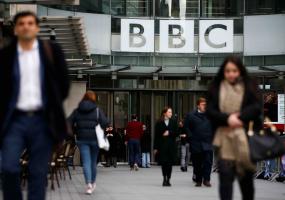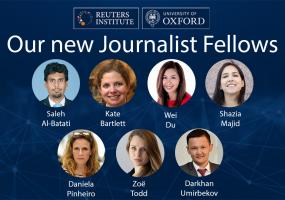Is the media having a "seriously adverse" impact on public life?
05 Dec 2007
Tony Blair called the media distracting, unbalanced, demoralising, even overwhelming. Are we, as the ex-PM claimed, “all being dragged down by the way media and public life interact"? Four senior figures from public life discussed Blair’s claims in a special live debate hosted by the Media Standards Trust and the Reuters Institute for the Study of Journalism The event was being held at the Foreign Press Association in Carlton House Terrace from 6.30-8pm on Wednesday 28th November. A "proper and considered" debate about the media Before stepping down as Prime Minister, Tony Blair gave a speech at Reuters in which he argued the media were having a 'seriously adverse" impact on public life. His argument was drowned out by accusations of hypocrisy – the political pot calling the media kettle black – and by his unfortunate description of the media pack as hunting like a "feral beast". But did some of his argument have merit? In constantly seeking impact, is the media in danger of misrepresenting people and potentially misleading the public? And shouldn’t we at least take Tony Blair’s modest plea seriously, to have: a proper and considered debate about how we manage the future, in which it is in all our interests that the public is properly and accurately informed? To discuss these questions – without the distraction of politicians – we gathered together four senior figures from public life – the military – the Civil Service – the church and a figure who acts on behalf of the general public. On the panel: General Sir Rupert Smith - retired from the British Army in 2002. His last appointment was Deputy Supreme Commander Allied Powers Europe 1998-2001, covering NATO's Balkan operations, including the Kosovo bombing. Prior to that he was the general Officer Commanding in Northern Ireland, 1996-1998; Commander UNPROFOR in Sarajevo, 1995; the Assistant Chief of Defence Staff for Operations, 1992-1994; and General Officer Commanding 1 (UK) Armoured Division, 1990-1992, including the Gulf War. Since retiring he has written a book, The Utility of Force: The Art of War in the Modern World (Penguin Books, 2006), which examines the use of force to solve political problems. Lord Michael Jay - served as Permanent Under-Secretary of State, at the Foreign and Commonwealth Office and Head of the Diplomatic Service from 2002 to 2006. He led diplomatic efforts during the UK Presidency of the G8 in 2005 leading to the G8 Summit at Gleneagles in 2005. Sue Stapely – is a solicitor and former BBC programme maker who for the past decade has specialised in reputation, crises and issues management counsel for businesses, organisations and individuals of all kinds. She has handled many major news stories, and on a pro bono basis worked for several members of the public who have inadvertently been caught up in the media glare - running the campaign for Sally Clark and her family, for example, and supporting the fiancee of Tom ap Rhys Pryce, the young lawyer stabbed to death in January 2006. Her book, Media Relations for Lawyers (The Law Society) is the recommended text for lawyers when dealing with the media. She has recently joined the board of the Media Standards Trust. Tim Livesey – is head of public affairs at Lambeth Palace. He worked in the Foreign and Commonwealth Office from 1987, before taking a position as assistant press secretary to the Prime Minister in 2000. In 2002 he became principal adviser for public affairs to Cardinal Cormac Murphy-O'Connor after which he took his current position at Lambeth Palace. Climate of fear Blair suggested that not having a proper press operation nowadays "is like asking a batsman to face bodyline bowling without pads or headgear". "Talk to senior people in virtually any walk of life today - business, military, public services, sport, even charities and voluntary organisations" Blair said, "and they will tell you the same. People don't speak about it because, in the main, they are afraid to". Michael White (assistant editor, The Guardian) asked whether this is true – and each of the four panel members discussed how the media has effected their lives and their work. Martin Moore, Director of the Media Standards Trust, welcomed the opportunity to compare four very different perspectives on how to deal with the media. He found the panel's comments offered some genuine insights into an increasingly important issue. Read the full text of Tony Blair's Reuters speech on public life on 12 June 2007 here (with thanks to Martin Moore and the Media Standards Trust)



